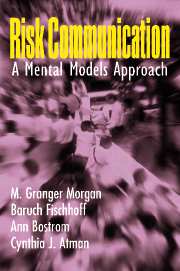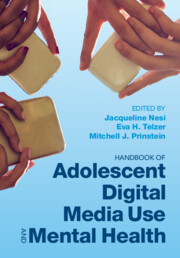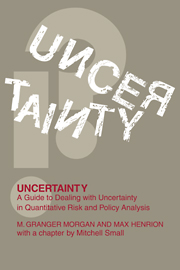Risk Communication
This book explains how to develop more effective risk communications using the Carnegie Mellon mental-model approach. Such communications are designed to contain, in readily usable form, the information that people need to make informed decisions about risks to health, safety, and the environment. The approach draws together methods from the natural and social sciences, providing a framework for interdisciplinary collaboration. It is demostrated with varied examples including electromagnetic fields, climate change, radon, and sexually transmitted diseases.
- Provides clear step-by-step explanations of how to develop risk communications using a mental models-based approach
- Includes numerous practical examples
- The approach has a solid theoretical foundation and has received extensive empirical evaluation
Reviews & endorsements
'The authors' idea of expert models of risk … is a very useful one, both for practitioners and academics doing work in this area. In fact, the chapters outlining these models made a very important and unique contribution in the field of risk communication and for that reason alone the book should be on the reading list of everyone doing research in that area.' International Journal of Public Opinion Research
Product details
July 2001Paperback
9780521002561
366 pages
227 × 151 × 10 mm
0.5kg
41 b/w illus. 14 tables
Available
Table of Contents
- 1. Introduction
- 2. The Carnegie Mellon mental models approach
- 3. Creating an expert model of the risk
- 4. Mental model interviews
- 5. Confirmatory questionnaires
- 6. Development and evaluation of communications
- 7. Case studies: applications to environmental risks
- 8. A mental models approach to HIV/AIDS
- 9. Some concluding remarks
- Appendices.








